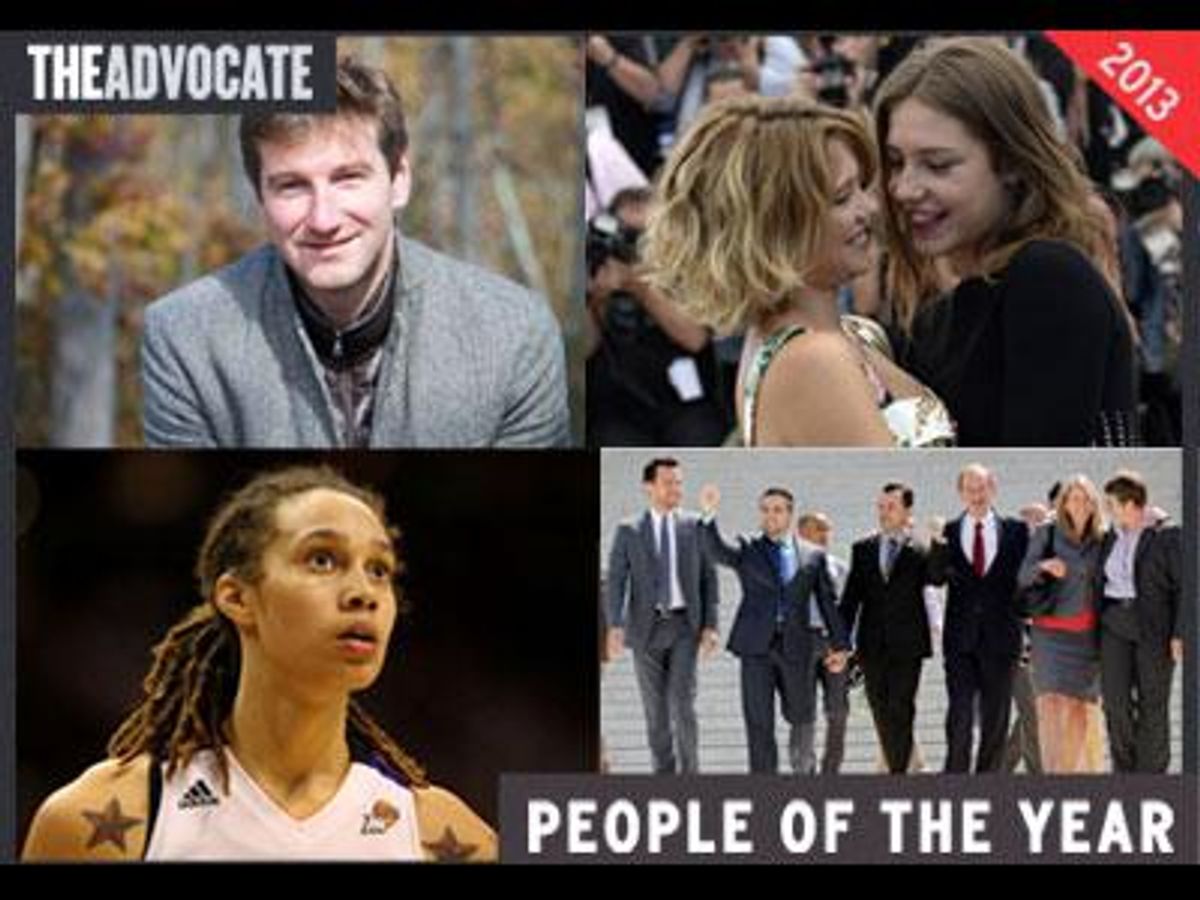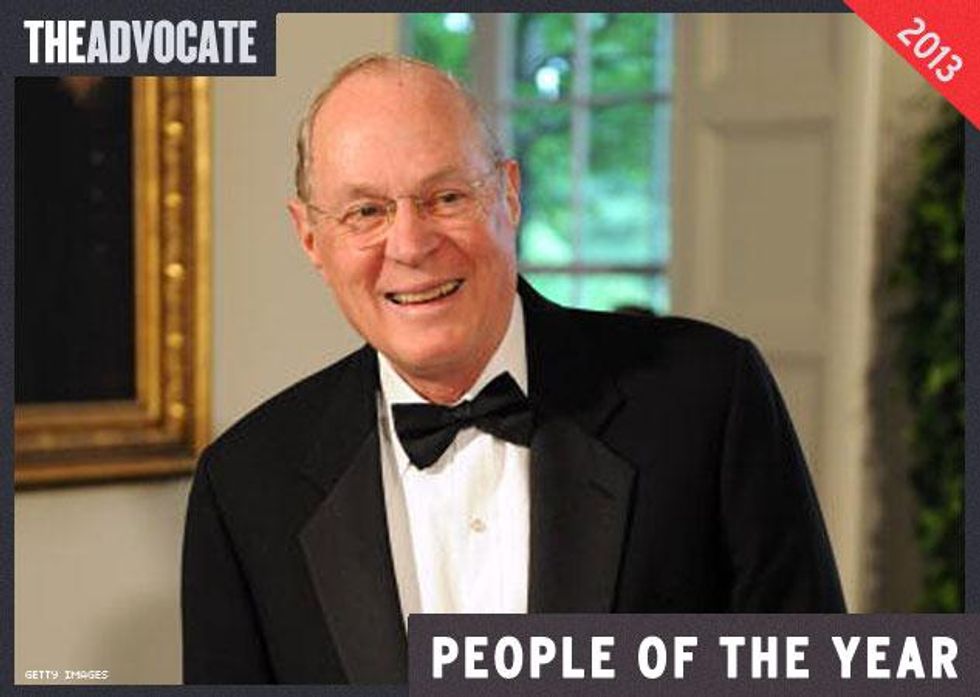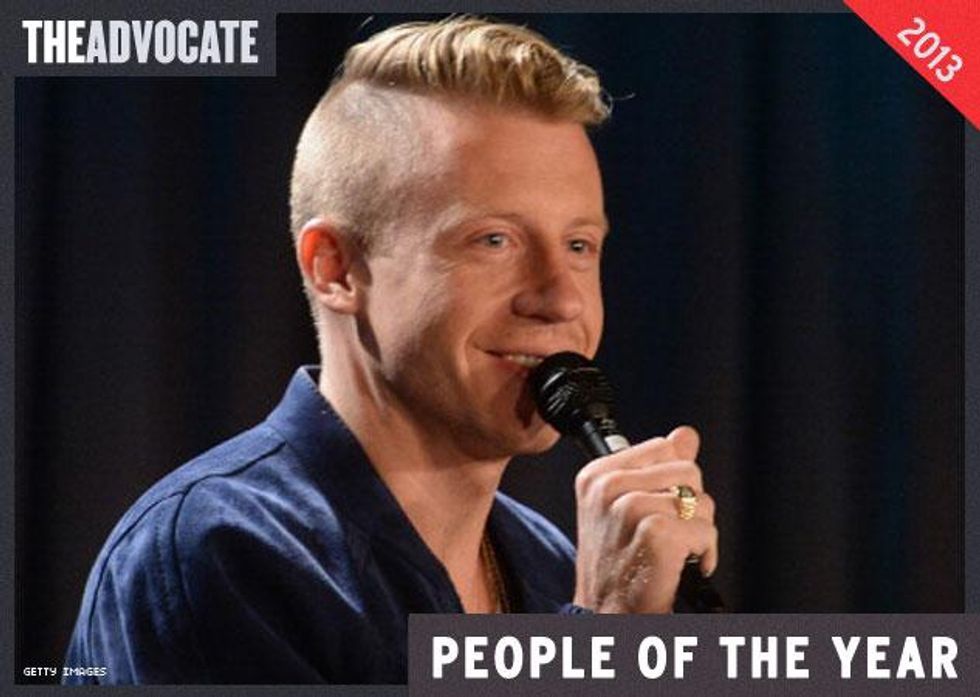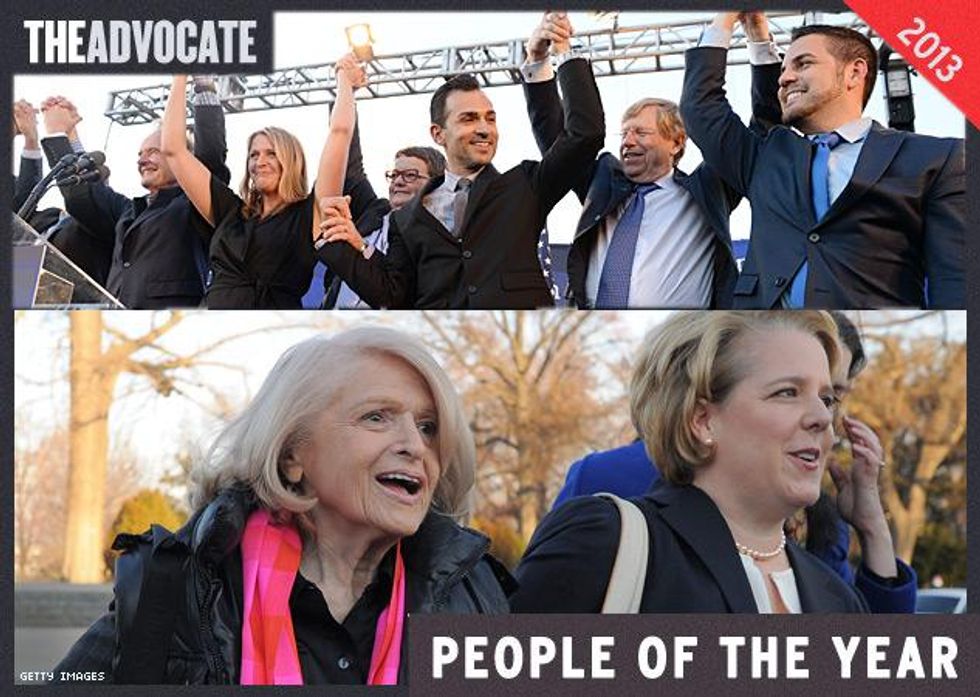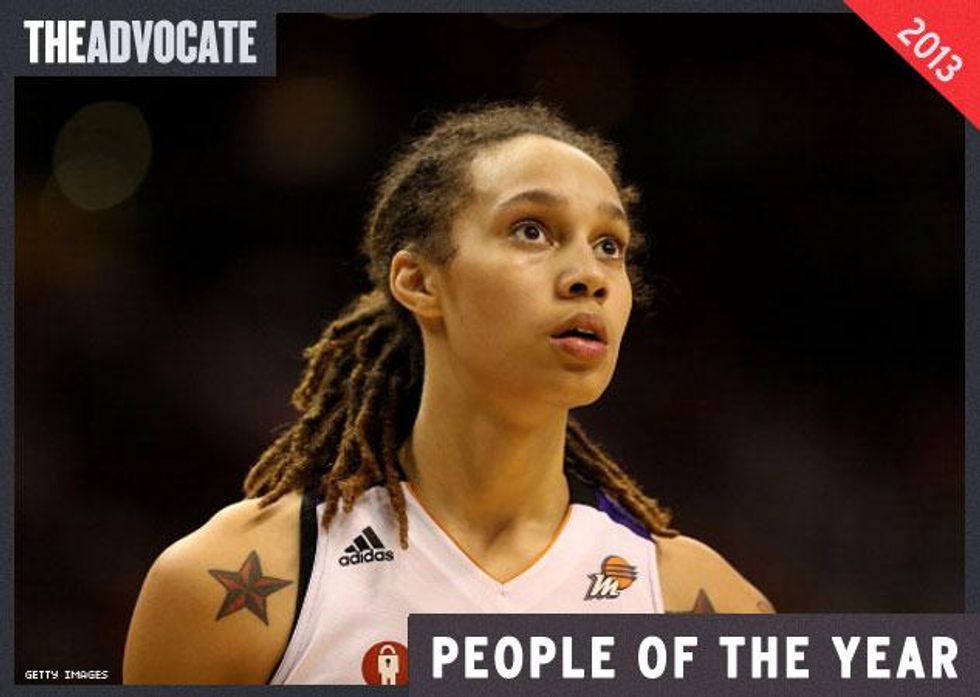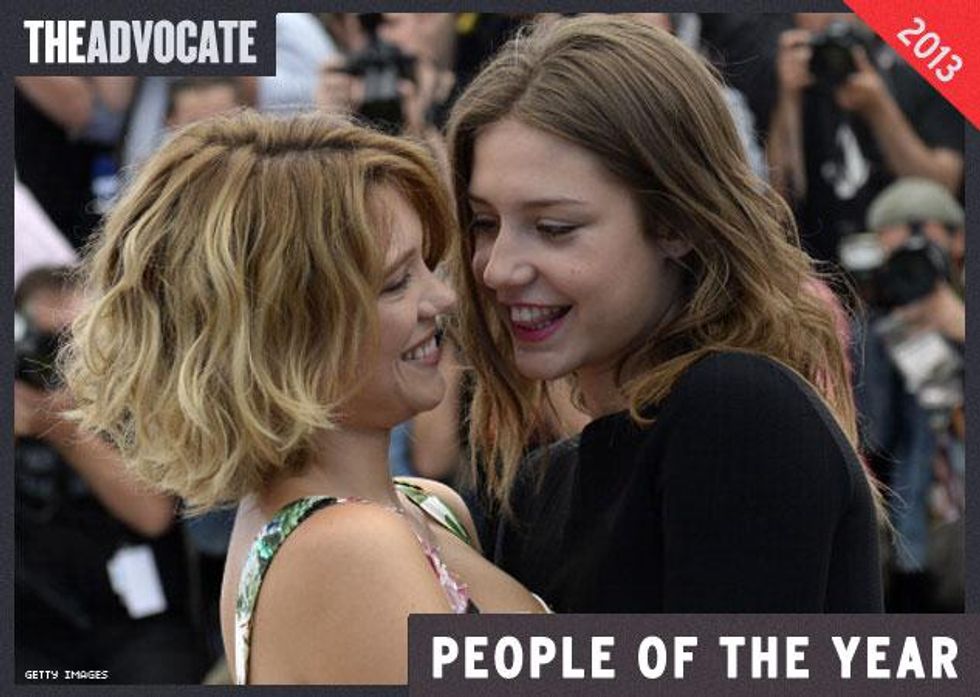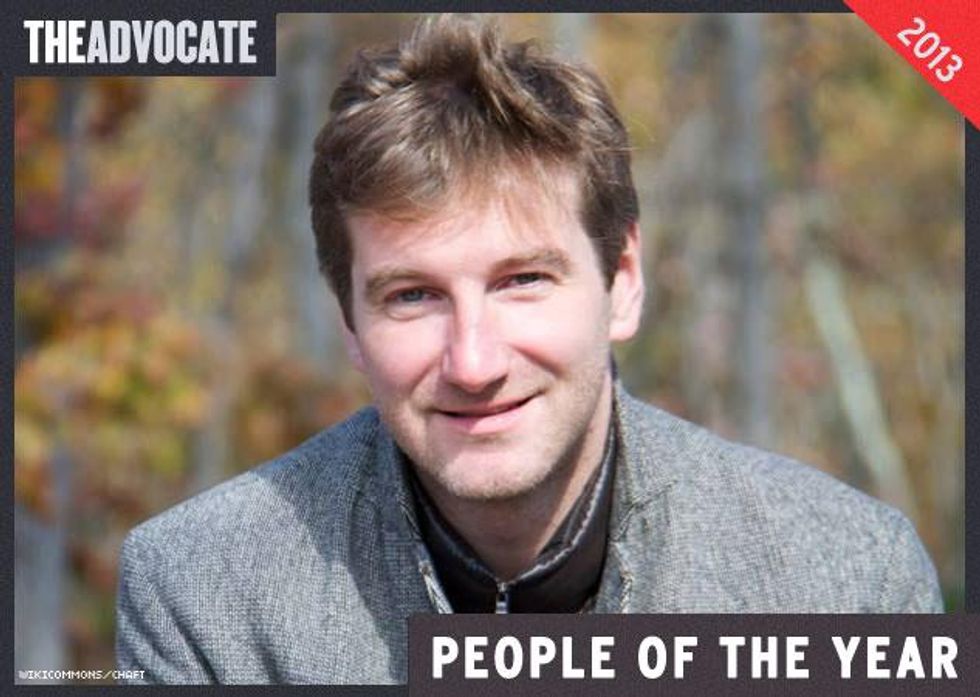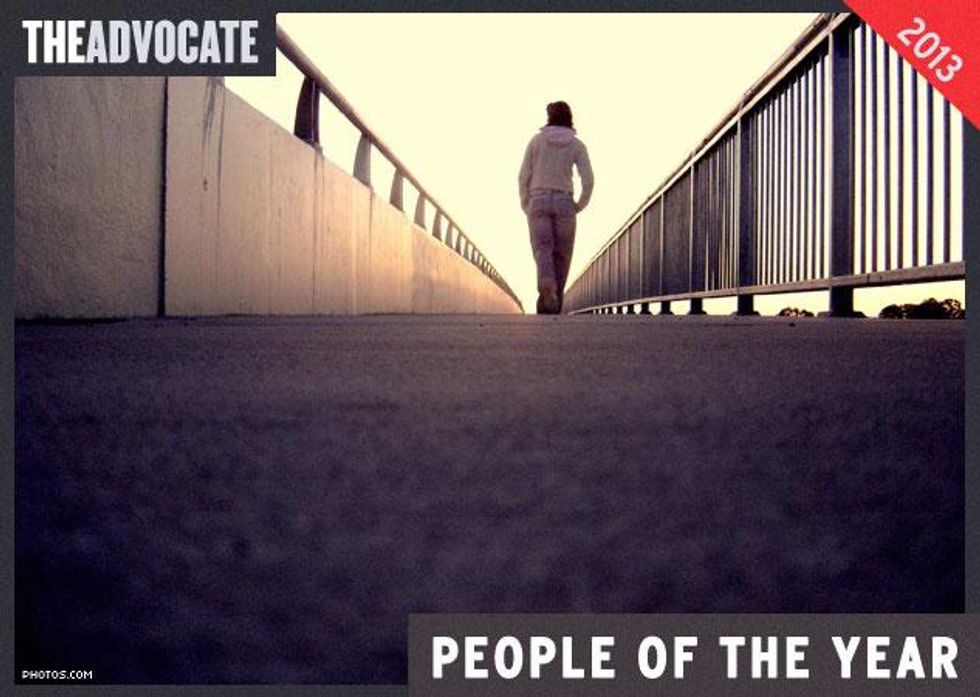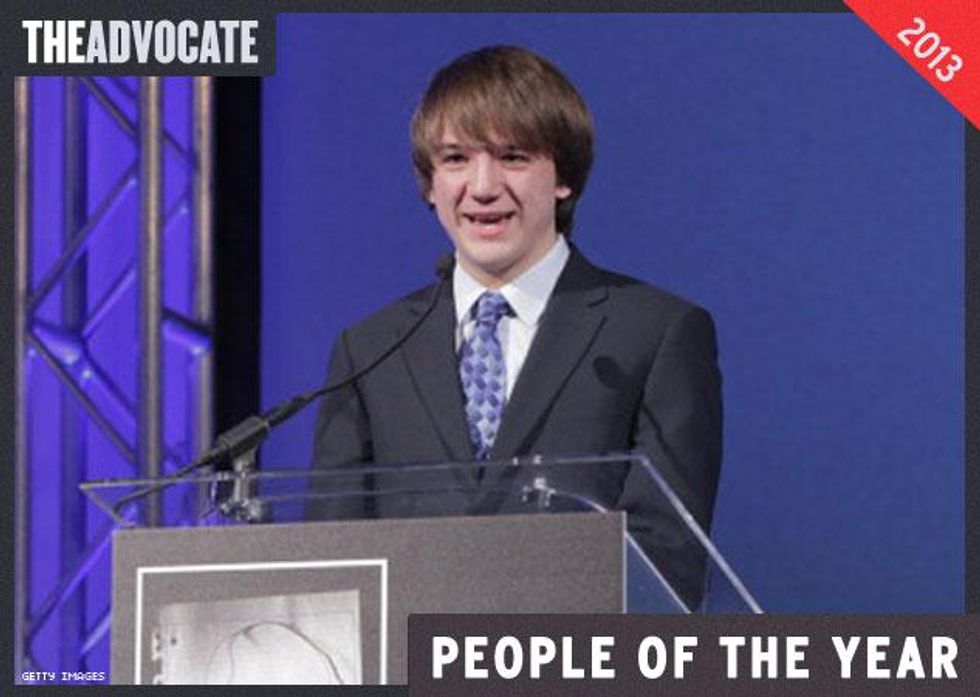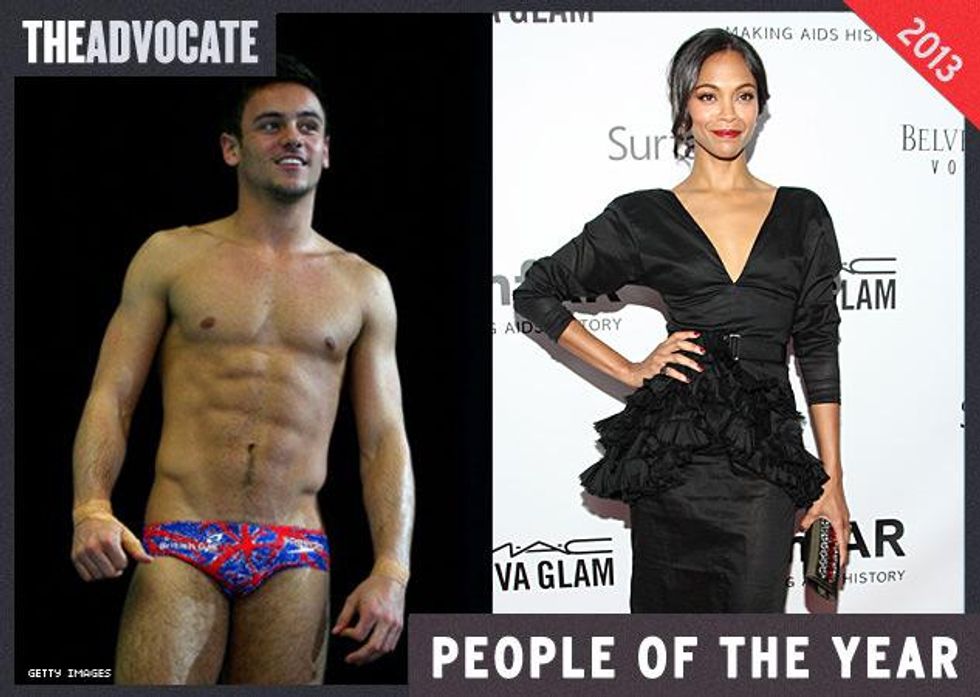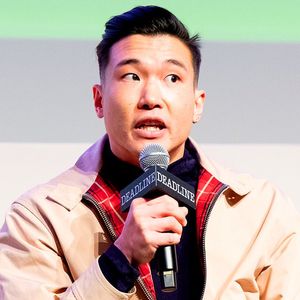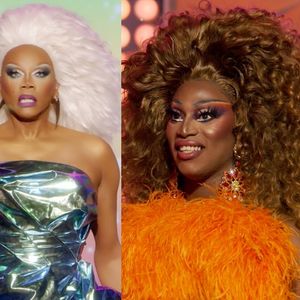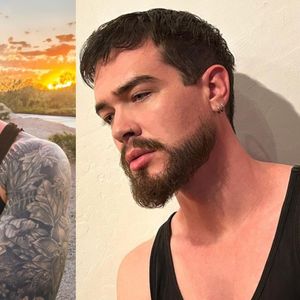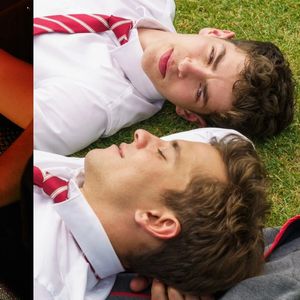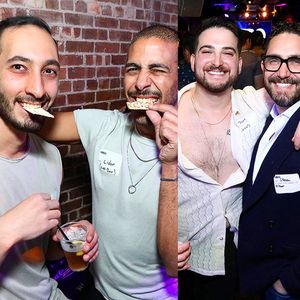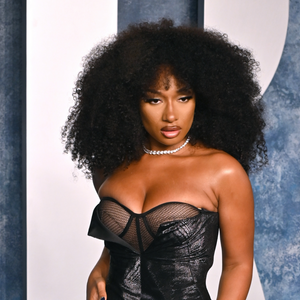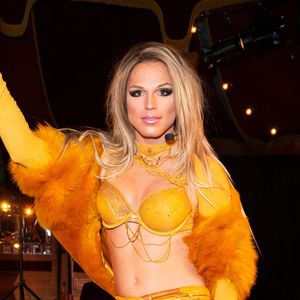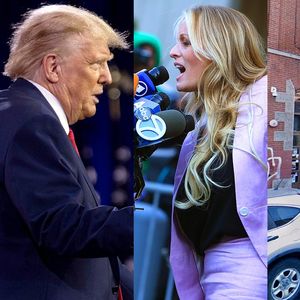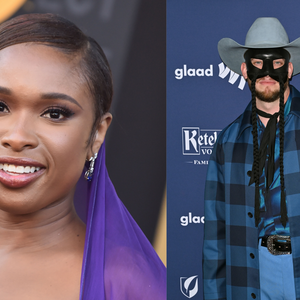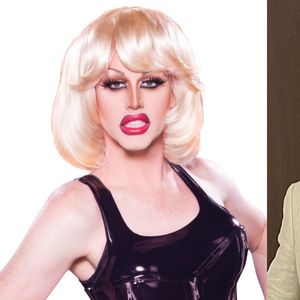While The Advocate has selected Pope Francis as Person of the Year for his impact on LGBT lives the world over, 2013 was a busy year that included major accomplishments from so many in the United States and elsewhere. (Read more about the selection of the pope.)
After vigorous debate, editors winnowed the list of outstanding figures to 10 in total. The resulting list spans multiple forms of accomplishment, multiple countries, and is representative of the struggles and successes that defined 2013 for LGBT people.
The other nine finalists for Person of the Year are presented here in no specific order.

FINALIST: JUSTICE ANTHONY KENNEDY
Before the Supreme Court took up its two marriage equality-related cases this year, everyone already knew which vote would become most pivotal -- that of Anthony Kennedy. With four of the court's justices leaning liberal and another four leaning conservative, Kennedy is often the swing vote in the most difficult and important cases.
Kennedy ruled in favor of equality this year but took his role even further, writing a majority opinion in the Windsor v. U.S.A. case that was praised by LGBT activists while being attacked in a dissent written by Antonin Scalia because it could become, Scalia worried, the foundation for an eventual ruling that brings marriage equality to all 50 states. In a 5-4 decision, Kennedy called out the federal Defense of Marriage Act as serving no other purpose except discrimination. "DOMA's principal effect is to identify a subset of state sanctioned marriages and make them unequal," he wrote. "The principal purpose is to impose inequality, not for other reasons like governmental efficiency. Responsibilities, as well as rights, enhance the dignity and integrity of the person. And DOMA contrives to deprive some couples married under the laws of their State, but not other couples, of both rights and responsibilities."
Kennedy didn't sit quietly during hearings either. Although the fate of Proposition 8 in California was decided on more technical terms, discussion during the hearing got to the root of what's wrong with the state's ban on same-sex marriages. "There is an immediate legal injury," Kennedy suggested, "and that's the voice of these children." He was concerned for the thousands of kids with same-sex parents. "They want their parents to have full recognition and full status," Justice Kennedy said. "The voice of those children is important in this case, don't you think?" That's just one example for why Kennedy is not only an important vote but also an important voice for fairness.
-- Lucas Grindley

FINALIST: MACKLEMORE
There was collective deja vu felt when news broke this year that Eminem's latest album contained gay slurs and lyrics of violence directed toward LGBTs. But there was something different this time, compared to 1999, when Em's first gay-baiting album pissed us off: A rapper, just as popular, preached the opposite sentiment on radio stations across the country.
"Same Love," the fourth single from Seattle artist Macklemore, landed on the Billboard Hot 100 in February, eventually ascending to number 11 in August and number 2 on the Rap Chart in July. The song didn't make waves just in the U.S., but charted from New Zealand to Denmark. "Same Love," which featured lesbian singer Mary Lambert, wasn't a vague testament to loving everyone, but a personal declaration of support for gays and an indictment of right-wing activists, mean-spirited online commenters, the term "that's so gay," and "America the Brave," which "still fears what we don't know."
Macklemore, real name Ben Haggerty, wrote the song in 2012 in support of Washington State's proposed, and eventually passed, marriage equality law. He grew up with two gay uncles in the Seattle gayborhood of Capitol Hill, which made it hard for him to reconcile the ingrained homophobia of hip-hop. Even without his embrace of LGBT equality, Macklemore was always an unlikely rap star: The single that propelled him to stardom, "Thrift Shop," was about rejecting the culture of consumerism so embraced by his peers. The fact that "Thrift Shop" is one of the most ubiquitous songs of the decade underscores the enormous influence of Macklemore's messages, including that of "Same Love."
But Macklemore didn't just release "Same Love" in a vacuum; he performed it everywhere from The Colbert Report to the Video Music Awards, gave interviews about its impetus, donated proceeds to Music for Marriage Equality, and made an equally heartfelt video. While we likely have to endure Eminem for a few more years, Macklemore is our musical future.
--Neal Broverman

FINALIST: THE PLAINTIFFS
When the case to fight Proposition 8 first launched with the backing of the newly formed American Foundation for Equal Rights and powerhouse lawyers Ted Olson and David Boies, it was the subject of harsh debate among LGBT activists about whether the right time was now for a full press on marriage equality rather than civil unions. Much of that is now forgotten, and the plaintiffs in the case -- Kristin Perry and Sandy Stier, and Paul Katami and Jeff Zarrillo -- have not only won the argument, but they did it at the Supreme Court.
Then there's Edie Windsor, who made a point of noting that her case was also turned away by major LGBT rights organizations when she first tried fighting the Defense of Marriage Act. It was attorney Roberta Kaplan who recognized its potential.
Thanks to the perseverance of all of the plaintiffs and their lawyers, same-sex marriage had an important legal moment and an important cultural one. Social media was filled with supportive red equality signs, and friends were given reason to talk about their beliefs. Meanwhile, the biggest mainstream news outlets paused to talk about LGBT equality. The immediate effect of these cases is marriage equality in California, plus the demise of section 3 of the Defense of Marriage Act. Couples' marriages are being recognized, and many who refile taxes are getting money back from the government. Binational couples who were being split up because the federal government would not recognize their marriages are no longer facing that threat. Members of the U.S. Armed Forces finally can have their spouses considered part of the family. The effects are still being felt as the Supreme Court's ruling is referenced in cases going forward.
But listen to Windsor, who has spoken so eloquently for us throughout, and you'll agree on the decision's most important effect. On the day of the ruling, she told a room full of cameras and reporters, "Not only does a much larger portion of our country, and the straight members of our country, see us differently, as just people who live and love who bring up kids who will play with their kids, but our own community has come out and seen each other and loved each other in a way that makes me courageous and proud and joyous every day."
-- Lucas Grindley

FINALIST: BRITTNEY GRINER
To feminists and female sports fans, ensuring the health of women's sports is crucial. While male athletes can concentrate on being athletes, women too often are held to different standards: You have to look like a Victoria's Secret model, even if you can dunk. You can't be butchy, ever, because it gives away the secret that lesbians play sports. You can't be tough, either, so turn down that grunting, Williams sisters.
Enter Brittney Griner, the no-nonsense center on the Phoenix Mercury and the WNBA's number one draft pick. Not only was Griner unparalleled in college basketball, but she ended her career at Baylor by coming out in several interviews in April. "Don't hide who you really are," she told others in sports.
Griner is the lesbian athlete that women's sports needs -- unabashedly comfortable with herself, charming, media-beloved, and can dunk like it's nobody's business. Her charm has gotten her an endorsement with Nike, the pinnacle of deals that every athlete on this planet craves. Griner may not have won Rookie of the Year -- probably in part to a knee injury that curbed her season a bit -- but she was unanimously voted onto the 2013 All-Rookie Team. The buzz around Griner, and her class of outstanding rookies, have brought excitement back into the league.
Most importantly, though, Griner should be considered the answer to the nagging question, Can a gay athlete come out, be accepted on a team, play magnificently, and still earn endorsements? Some seem to think that question only concerns male athletes like NBA veteran Jason Collins or Major League Soccer's Robbie Rogers, who both came out earlier this year. But Griner sets the bar for everyone in professional sports by being herself from the outset, no matter if it means challenging traditional gender roles and mores that some still find acceptable.
-- Michelle Garcia

FINALIST: Lea Seydoux and Adele Exarchopoulos
The Cannes Film Festival made an unprecedented move this year by awarding the Palme d'Or to not only the director of Blue Is the Warmest Color, a romantic drama based on the acclaimed graphic novel by Julie Maroh, but also to its leading actresses: Lea Seydoux and Adele Exarchopoulos. In the year France achieved marriage equality, the jurors' recognition of actresses who depict two women passionately in love was an act that attracted international attention. Their achievement is remarkable in part because of their age - presently, Seydoux is 28 and Exarchopoulos is 20 years old. They are also now the only women other than Piano director Jane Campion to ever receive the coveted Palme d'Or. Official accolades are likely to continue, with the Golden Globes nominating Blue Is the Warmest Color last week for Best Foreign Film.
While the film has come under fire for its indulgent sex scenes -- director Abdellatif Kechiche reportedly spent days filming the young actresses in a nearly nude state -- Blue Is the Warmest Color has made an indelible mark in cinema history for the raw honesty of love and loss so intimately captured by Seydoux and Exarchopoulos. Queer women in audiences around the world relate to the story of a French teenager and her sexual awakening, which is sparked by the arrival of a blue-haired artist who helps lead her on a journey of self-discovery. But thanks to the talents of Exarchopoulos and Seydoux, this tale becomes universal, a love story that is remarkable not because it involves two women, but because it shows two people braving the beautiful and brutal vicissitudes of l'amour.
-- Daniel Reynolds

FINALIST: ANTON KRASOVSKY
As the Russian Parliament considered a ban on so-called gay propaganda, with President Vladimir Putin expected signed it into law, it was already dangerous to talk publicly about being gay. Yet Russian TV anchor Anton Krasovsky dared to challenge what was happening by coming out -- live on air.
On January 25, he looked into the camera and told viewers that he is gay and "as human as President Putin." Since then, Putin formally signed the law in July, and worse could be on the way, as Parliament is expected to consider a bill that would remove children from their homes if their parents are gay.
During a recent interview with MSNBC's Thomas Roberts, Krasovsky said, "It's time; now it's time to be open." Krasovsky lost his job within hours after coming out. Working as editor in chief of Kontr TV, which was launched by the Kremlin, Krasovsky said he knew that would happen. He told Roberts that he wants to remain in Russia and is still without a job.
Krasovsky is perhaps the most prominent of LGBT Russians to take a stand, though others in the country have staged protests that were met with arrests and sometimes beatings. If what's happened there is to be reversed, Krasovsky is a brave example of what it might take.
--Lucas Grindley

FINALIST: JANE DOE, TRANS TEEN IN COLORADO
The fight over equal rights for transgender people is starting with young people. In California, which this year passed the Student Success and Opportunity Act to protect trans students in its schools, right-wing groups made the bill a call to action and attempted to gather enough signatures to force a vote that would repeal it. So far, they've failed.
Then in October, when a so-called Christian group in California calling itself the Pacific Justice Institute set its sights on an innocent transgender teenager in Colorado, LGBT advocates nationwide -- including those working at this publication -- condemned the move as downright nasty. "Jane Doe," a 16-year-old transgender girl at Florence High School, just outside of Colorado Springs, was first accused of "harassing" fellow female students in the bathroom. The district superintendent and local police confirmed no harassment took place, but PJI amended its claim to say that Jane's mere presence in the bathroom was "inherently harassing." The right-wing group even produced a video featuring cisgender (nontrans) schoolmates and their parents who claimed they'd "suffered" because the students were forced to share a bathroom with someone who, as one anonymous teen put it, "doesn't have the same parts as me."
After some anti-trans activists published Doe's given name, she was subjected to vile personal attacks online, some rising to the level of death threats. Doe's mothers reported that their daughter had been placed on suicide watch after a nation's ignorance was unwittingly heaped upon their doorstep. For the time being, it appears the Pacific Justice Institute has stepped back its harassment of this teen, though the institute never apologized. With the support of her moms, her school district, and recently reaffirmed Colorado state law on her side, Doe persevered through unimaginable cruelty directed at her simply for who she is.
"I want to be able to let people know I haven't done anything to harm any being and I am a human with feelings too," Doe told TransAdvocate's Cristan Williams in October. "I just really hope from all of this comes good, and allows more minds to become accepting and open."
-- Sunnivie Brydum

FINALIST: JACK ANDRAKA
Most of us take our jobs seriously, but sometimes we put them in perspective by saying, "Well, it's not like we're curing cancer." But this gay science prodigy's work may actually play a role in curing cancer, by aiding in early detection. At age 15, when most kids are focused on prom dates and video games, Andraka developed a low-cost, sensitive dipstick-type test for quick and early detection of pancreatic, ovarian, and lung cancers.
After a close family friend's death from cancer, Andraka began researching the disease. "What I found is that 85 percent of all cancers are diagnosed late, when someone has less than a 2 percent chance of survival, and our current method of detection costs $800, misses 30 percent of all cancers and is 60 years old. So then I decided to set out to change all this," he recently told The Washington Post. His test is not on the market yet, but he has formed a company and applied for national and international patents. His work has won him several awards, including the Smithsonian American Ingenuity Youth Award, the International Giuseppe Sciacca Award, and the Gordon E. Moore Award, named for the founder of Intel. This year he's wowed Stephen Colbert on The Colbert Report;been profiled by 60 Minutes, which did not see any need to mention that he's gay; and been named to the Out 100, an annual list of LGBT achievers compiled by The Advocate's sister publication Out, which did of course note his orientation.
Andraka, now 16, attends high school in Glen Burnie, Md., does scientific research at Johns Hopkins University in Baltimore, and is dedicated to being a "normal kid" who enjoys sports and socializing -- but also to being visible as a gay scientist. "I was really afraid of coming out as gay because there are no gay scientists," he told the Post. Many gay teens have contacted him to say he's an inspiration, but he still has yet to find another gay scientist, he added. There are undoubtedly plenty out there, however, and Andraka's example may well inspire more.
-- Trudy Ring

FINALIST: THE BISEXUALS
You'd be hard-pressed to name a year in American history in which bisexuals were more embraced by the public than 2013 -- that despite the fact that many people who we might label bisexual (or who at least participate in bisexual activities or attractions) may prefer not to use that word at all.
This year, one of Hollywood's hottest young actresses, Zoe Saldana, told Allure she had been with women, could end up with a woman, married raising little Saldana babies. Prime Suspect star Maria Bello wrote a moving essay in The New York Times about being in a relationship with another woman, while Tom Daley did a YouTube video about being in love with another man -- both of them forging a bisexual public identity but without saying the word.
When former American Idol star Crystal Bowersox released a song of LGBT support, she did use the word, proudly coming out as bi. Same thing for 81-year-old music producer Clive Davis. "Bisexuality is misunderstood; the adage is that you're either straight or gay or lying, but that's not my experience," he wrote in a memoir released this year. "To call me anything other than bisexual would be inaccurate."
What all these folks are doing, though, is forging a new path where they don't feel compelled either to identify with the acceptable label, nor will they be forced (as their older counterparts felt they were) to "choose" between gay and straight identity (as clearly many others in history did, and some pundits still encourage). This year's group wasn't the first, clearly (Anna Paquin, Evan Rachel Wood, and a host of Beat poets and second-wave feminists like Holly Near beat them to it), but they reflect what we hope is and what will go down in history as a watershed moment. Their "bi any name" identities reflect not just their own modern lives but a growing pop-cultural landscape in which talking about or even casually mentioning your bisexuality (see: Two Broke Girls, Dracula, Two and a Half Men) isn't a scary thing, nor is refusing to rewrite your previous history as either gay or straight (as Elton John did, but Bill DiBlasio's wife won't) to fit a new one. More power to them.
--Diane Anderson-Minshall
